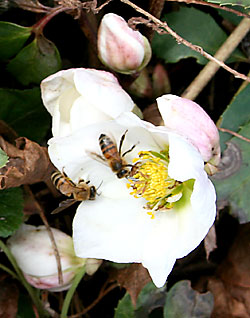 There’s a diary over at DailyKos about a Beltway gathering going on looking at Colony Collapse Disorder (CCD).
There’s a diary over at DailyKos about a Beltway gathering going on looking at Colony Collapse Disorder (CCD).
It will be interesting to see what they come up with. But what caught my eye was the writer talking about how a third of the U.S. diet — particularly the tasty crops — depend on pollinators. One crop singled out was asparagus.
Can you think of any crop less dependent on pollinators than asparagus? Oy. I’m glad there is growing concern about pollinator problems. But please don’t compromise your credibility by telling everyone that our asparagus is threatened by CCD.
